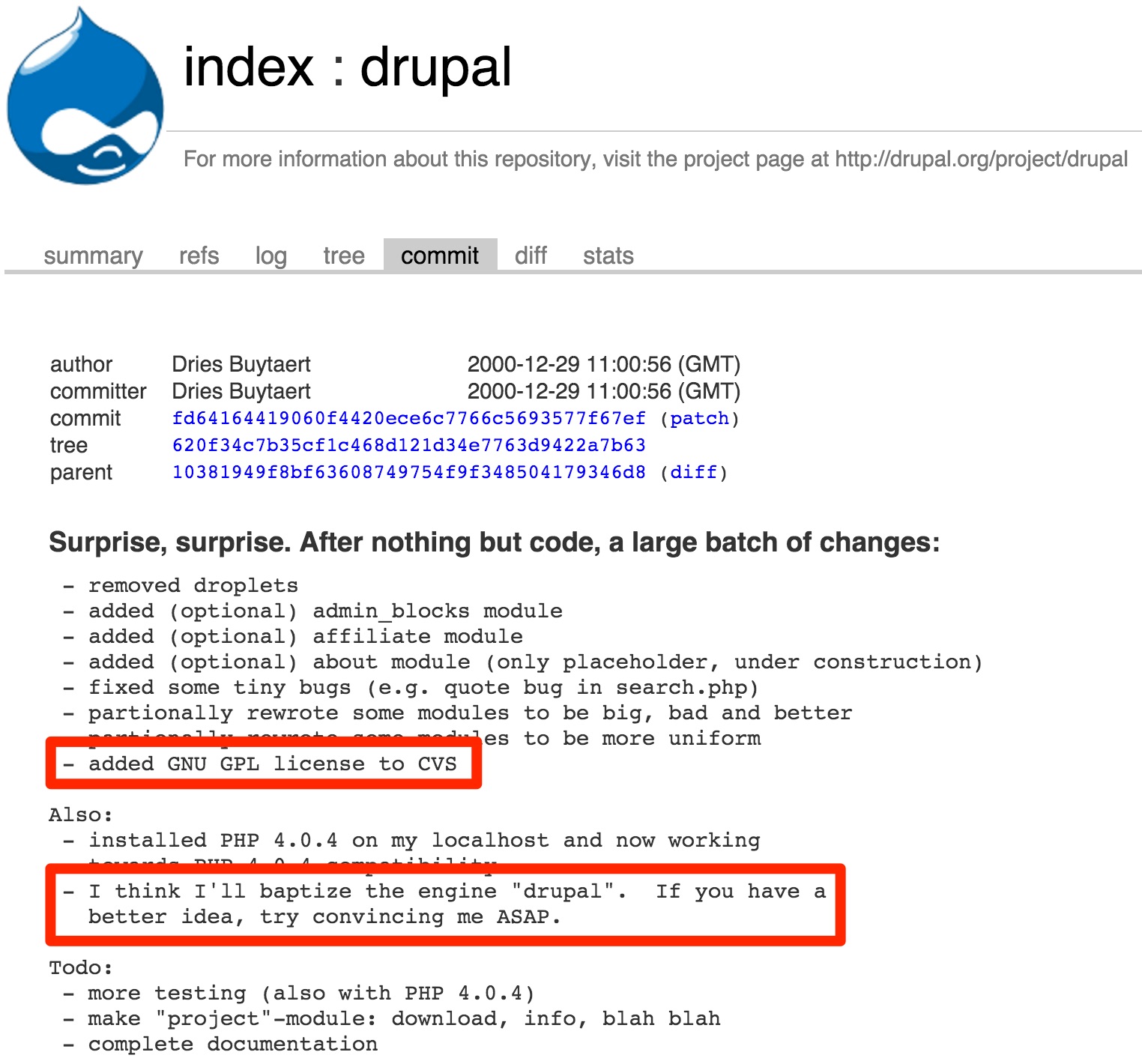Drupal: 15 years old and still gaining momentum
On December 29, 2000, I made a code commit that would change my life; it is in this commit that I called my project "Drupal" and added the GPL license to it.

A couple weeks later, on January 15, 2001, exactly 15 years ago from today, I released Drupal 1.0.0 into the world. The early decisions to open-source Drupal and use the GPL license set the cornerstone principles for how our community shares with one another and builds upon each other's achievements to this day.
Drupal is now 15 years old. In internet terms, that is an eternity. In 2001, only 7 percent of the world's population had internet access. The mobile internet had not entered the picture, less than 50% of the people in the United States had a mobile phone, and AT&T had just introduced text messaging. People searched the web with Lycos, Infoseek, AltaVista and Hot Bot. Google – launched in 1998 as a Stanford University research project – was still a small, private company just beginning its rise to prominence. Google AdWords, now a $65 billion business, had less than 500 customers when Drupal launched. Chrome, Firefox, and Safari didn't exist yet; most people used Netscape, Opera or Internet Explorer. New ideas for sharing and exchanging content such as "public diaries" and RSS had yet to gain widespread acceptance and Drupal was among the first to support those. Wikipedia was launched on the same day as Drupal and sparked the rise of user-generated content. Facebook and Twitter didn't exist until 4-5 years later. Proprietary software vendors started to feel threatened by open source; most didn't understand how a world-class operating system could coalesce out of part-time hacking by several thousand developers around the world.
Looking back, Drupal has not only survived massive changes in our industry; it has also helped drive them. Over the past decade and a half, I've seen many content management systems emerge and become obsolete: Vignette, Interwoven, PHP-Nuke, and Scoop were all popular at some point in the past but Drupal has outlived them all. A big reason is from the very beginning we have been about constant evolution and reinvention, painful as it is.
Keeping up with the pace of the web is a funny thing. Sometimes you'll look back on choices made years ago and think, "Well, I'm glad that was the right decision!". For example, Drupal introduced "hooks" and "modules" early on, concepts that are commonplace in today's platforms. At some point, you could even find some of my code in WordPress, which Matt Mullenweg started in 2003 with some inspiration from Drupal. Another fortuitous early decision was to focus Drupal on the concept of "nodes" rather than "pages". It wasn't until 10 years later with the rise of mobile that we started to see the web revolve less and less around pages. A node-based approach makes it possible to reuse content in different ways for different devices. In a way, much of the industry is still catching up to that vision. Even though the web is a living, breathing thing, there is a lot of things that we got right.
Other times, we got it wrong. For example, we added support for OpenID, which never took off. In the early days I focused, completely and utterly, on the aesthetics of Drupal's code. I spent days trying to do something better, with fewer lines of code and more elegant than elsewhere. But in the process, I didn't focus enough on end-user usability, shunned JavaScript for too long, and later tried to improve usability by adding a "dashboard" and "overlay".
In the end, I feel fortunate that our community is willing to experiment and break things to stay relevant. Most recently, with the release of Drupal 8, we've made many big changes that will fuel Drupal's continued adoption. I believe we got a lot of things right in Drupal 8 and that we are on the brink of another new and bright era for Drupal.
I've undergone a lot of personal reinvention over the past 15 years too. In the early days, I spent all my time writing code and building Drupal.org. I quickly learned that a successful open source project requires much more than writing code. As Drupal started to grow, I found myself an "accidental leader" and worried about our culture, scaling the project, attracting a strong team of contributors, focusing more and more on Drupal's end-users, growing the commercial ecosystem around Drupal, starting the Drupal Association, and providing vision. Today, I wear a lot of different hats: manager of people and projects, evangelist, fundraiser, sponsor, public speaker, and BDFL. At times, it is difficult and overwhelming, but I would not want it any other way. I want to continue to push Drupal to reach new heights and new goals.
Today we risk losing much of the privacy, serendipity and freedom of the web we know. As the web evolves from a luxury to a basic human right, it's important that we treat it that way. To increase our impact, we have to continue to make Drupal easier to use. I'd love to help build a world where people's privacy is safe and Drupal is more approachable. And as the pace of innovation continues to accelerate, we have to think even more about how to scale the project, remain agile and encourage experimentation. I think about these issues a lot, and am fortunate enough to work with some of the smartest people I know to build the best possible version of the web.
So, here is to another 15 years of evolution, reinvention, and continued growth. No one knows what the web will look like 15 years in the future, but we'll keep doing our best to guide Drupal responsibly.
—